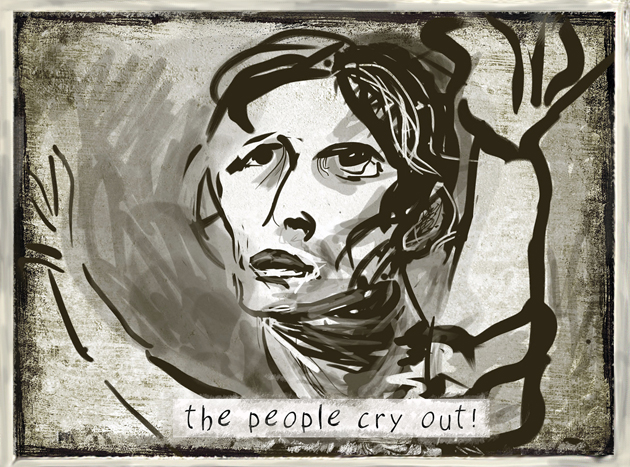A Dramatisation of Research Outcomes: A Verbatim Drama Based on the Lived Experience of Women Casual Academics
DOI:
https://doi.org/10.18432/R27P4JKeywords:
arts-informed inquiry, dramatisation, drama, casual academicAbstract
Within this article I offer a brief rationale for de-disciplining and re-disciplining research communication, present a drama script using the narrative experience of six women casual academics from across three Australian universities, and offer a succinct rationale for employing artistic forms of communication more generally, and drama more particularly, for re-presenting lived experience. The article predominantly focuses on the stories of women causal academics in Australian universities. It is their voices that are privileged and centralised. Women casual academics make up the majority of academics in Australia, yet they are currently ‘un-voiced’. This article therefore creates some space for the voices of women causal academics to be heard and known in a form that is congruent to their lived experienceReferences
Arnot, M. & Reay, D. (2007), ‘A Sociology of pedagogic voice: Power, inequality and pupil consultation’, Discourse: Studies in the Cultural Politics of Education, vol. no. 3, pp.311-325.
Bloomberg, L. & Volpe, M. (2008), Completing your qualitative dissertation, Sage Publications, Los Angeles.
Bruner, J. (1986), Actual minds, possible worlds, Harvard University Press, Cambridge, Mass.
Bruner, J. (1990), Acts of meaning, Harvard University Press, Cambridge, Mass.
Bruner, J. (1996), The culture of education, Harvard University Pres, Cambridge, Mass.
Cahnmann, M. (2008), ‘Arts-based approaches in language education’, in K King, & N Hornberger (eds), Research methods in language and education, Springer, New York.
Coates, H., Dobson, I., Edwards, D., Friedman, T., Goedegebuure, L. & Meek, L. (2009), ‘The attractiveness of the Australian academic profession: A comparative analysis’, viewed 20 March 2014, http://repository.unimelb.edu.au/10187/8900.
Deleuze, G. (1990), The logic of sense, trans M Lester & C Stivale, The Athlone Press, London.
Etherington, K. (2004), Becoming a reflexive researcher, Jessica Kingsley Publishers, London.
Evans, D., Gruba, P., & Zobel, J. (2011), How to write a better thesis, 3rd edn, Melbourne University Press, Carlton Victoria.
Hendry, P.M. (2010), ‘Narrative as inquiry’, The Journal of Educational Research, vol. 10, no. 2, pp. 72–80, doi: 10.1080/00220670903323354.
Lyotard, J. (1984). The postmodern condition: A report on knowledge. Minneapolis: University of Minnesota Press
May, R., Strachan, G., Broadbent K., & Peetz, D. (2011), ‘The casual approach to university teaching; Time for a re-think?’ In K. Krause, M. Buckridge, C. Grimmer & S. Purbrick-Illek (Eds.), Research and development in Higher Education: Reshaping higher education, vol 34, pp. 188-197.
Merleau-Ponty, M. (1962), Phenomenology of perception. Routledge, London, UK.
Richardson, L. (1997), ‘Skirting a Pleated Text: De-Disciplining an Academic Life’, Qualitative Inquiry, vol. 3, no. 3, pp.295-303.
Wake C. (2010), ‘Towards a working definition of verbatim theatre’, in P Brown (ed.), Verbatim: Staging Memory and Community, Currency Press Strawberry Hills, Sydney, pp. 2-5.
Published
How to Cite
Issue
Section
License
Copyright (c) 2016 Art/Research International: A Transdisciplinary Journal

This work is licensed under a Creative Commons Attribution-NonCommercial-NoDerivatives 4.0 International License.
Authors who publish with Art/Research International agree to the following terms:
a. Authors retain copyright and grant the journal right of first publication and the right to sublicense the Contribution, in the form in which it is published by the journal, to others under the terms and conditions of the of the Creative Commons Attribution-NonCommercial-NoDerivs (CC BY-NC-ND) that allows others to download the work and share the work with others with an acknowledgement of the work's authorship and initial publication in this journal, but they cannot change the work in any way or use any part of the work commercially.
b. Authors are able to enter into separate, additional contractual arrangements for the non-exclusive public distribution and display of the journal's published version of the work (e.g., post it to an institutional repository or publish it in a book), with an acknowledgement of its initial publication in this journal.
c. Authors are permitted and encouraged to post their work online (e.g., in institutional repositories or on their website) prior to and during the submission process, as it can lead to productive exchanges, as well as earlier and greater citation of published work (See The Effect of Open Access).
d. Authors wishing to include items (such as images or other media, or any creative works of others whether previously published or not) must contact the original copyright holder to obtain explicit permission to publish these items in Art/Research International. Writing permission should include: the title(s) of any copyrighted work, original place of publication if applicable, and an acknowledgement of having read Art/Research International's copyright notice. Authors are responsible for obtaining this permission and keeping it in their own records for later verification.



